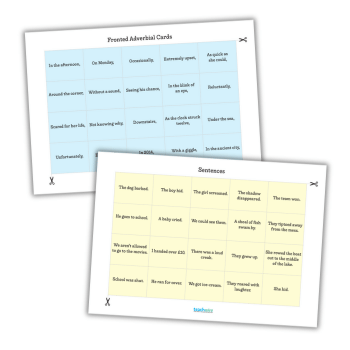Play a variety of fronted adverbials KS2 games with this simple PDF resource. Read our instructions for the four different fronted adverbials games you can play.
This fronted adverbials KS2 download contains:
20 fronted adverbial cards that you can print out and cut up. These include fronted adverbials such as:
- In the afternoon
- Around the corner
- Scared for her life
- Unfortunately
20 short sentences that you can print out and cut up. Examples include:
- The dog barked
- He goes to school
- We aren’t allowed to go to the movies
- School was shut
Laura Dobson worked for many years as a teaching and learning adviser for a large company and local authority. She now runs Inspire Primary English, providing consultancy and training in all areas of English. Follow Laura on Twitter at @inspireprieng. Browse more SPaG games.














